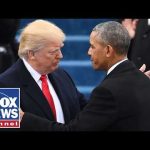A historic trade deal is lighting up the economic landscape, with President Trump announcing a jaw-dropping $600 billion in additional U.S. investments. This ambitious agreement not only slaps a 15% tariff on most European goods but also sweetens the pot for American exports by imposing a 0% tariff. This bold move has been described as a major win for both sides, showcasing a bright new chapter in U.S.-European relations.
The President believes that this deal is all about unity. He pointed out that the agreement brings the U.S. and Europe closer together, with a straightforward tariff structure for items like automobiles. It’s a remarkable shift that reveals optimism and the potential for increased economic collaboration. Trump’s vision is clear: he aims to ensure that countries participating in trade with the United States are paying their fair share. Instead of juggling a multitude of offers, the President intends to implement a global tariff, directly addressing those who want to do business in America.
Alongside addressing European markets, Trump has his sights squarely set on China. He hinted that trade discussions are underway and harbored hopes for yet another lucrative agreement. Trump has pointed out the recent success in negotiations with Indonesia, expressing a desire for parallel progress with China. This talk of a global economic reset shows a President committed to not just America, but to creating favorable conditions for everyone involved in these trading relationships.
Trump’s economic strategy doesn’t just stop with tariffs; it’s a new economic formula pushing for wealth and job creation in the U.S. By inviting foreign investments back into American shores, the President’s approach of using tariffs as tools for negotiation has surprised many, even some long-time advocates of free-market policies. The unexpected success of this strategy is leading to a rethinking of longstanding economic beliefs, with many now seeing the potential for a significant boost in wealth and employment.
But while the news of the new trade deal has brought smiles to many conservative faces, it’s not all smooth sailing. Critics from the other side question the effectiveness of such monumental changes and whether they’ll truly benefit Americans in the long run. Leaders in Europe have not missed the chance to express their discontent, suggesting that the deal is a dark day for the continent and portraying it as an act of submission. Meanwhile, Trump’s allies are reveling in the sentiment that “America is back,” celebrating the apparent triumphs of the current administration.
As this newest trade agreement unfolds, the implications for U.S. energy security, global markets, and international relationships are monumental. Decreasing dependency on countries like Russia for energy supplies could redefine geopolitical tactics and foreign alliances. It’s a chess game where the President is playing several moves ahead, while some countries seem lost on the board. The world of global trade and economics is ever-evolving, and this trade deal could signal a turning point not only for America but for international relations as a whole. The question remains: how will it shape the next chapter in world history?




